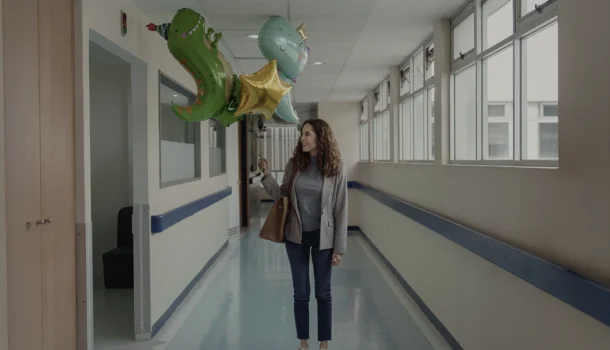Marriages are often sustained less by promises than by fractures — and some relationships blossom precisely through loyalty to shared damage. They are not two lovers projecting illusions into the future, but survivors of themselves who, in seeing their own flaws reflected in the other, discover the only truth they’re still capable of loving. In such cases, the bond isn’t celebration, but a pact of resistance: when everything collapses, it’s in the rubble that the most enduring form of affection is built.
In the narrative crafted by Mariana Chenillo, this idea takes on its most brutal — and most honest — shape in the birth of a child with severe cerebral palsy. “Lucca’s World”, inspired by the memoirs of Bárbara Anderson, lays bare the collapse and reconstruction of a couple in the face of the irreparable. It’s not about overcoming in the banal sense, but about the stubborn refusal to let love decay alongside hope. The film’s power lies precisely in this refusal to offer easy consolation — revealing instead the most ferocious dimensions of tenderness.
The presence of a child who will never align with parental ideals dismantles all clichés around motherhood and fatherhood. Bárbara and Andrés do not become heroes or martyrs — they become, above all, adults faced with the task of loving without reward, of caring without any promise of progress. When they hurl themselves into the search for an experimental treatment on another continent, the pilgrimage is not symbolic of miracle, but of exhaustion. The Cytotron in India offers less of a cure than a symptom of who they’ve already become: people who have learned to persist even when everything urges them to give up.
Bárbara Mori’s moving performance, sustained by a restraint that never slips into sentimentality, precisely articulates the desperation that hides behind the most courageous decisions. Juan Pablo Medina, in turn, builds an Andrés who makes no effort to be stoic or exemplary, but instead deeply human in his hesitation and fatigue. Together, they portray a relationship that endures not through romantic affection, but through a quiet alliance between two bodies wounded by the same lack of answers.
As Lucca, Julián Tello doesn’t play a symbol but a real presence, whose existence escapes narrative linearity and imposes its own rhythm — made of silences, repetitions, and small gestures. Through him, the film resists all temptation toward simplification. There is no redemption here. At best, there is coexistence with what cannot be changed — and for that very reason, it demands more from those who remain.
Anderson and Peñalosa’s script avoids moralism or easy compassion. What we are given is a chronicle of limits — of medicine, of empathy, of marriage. And yet, it is precisely within these limitations that the film finds its power. Vulnerability here is not weakness: it is truce. And it is in this suspended space — between what is lost and what must be invented to replace it — that life, crooked and off-balance, finds a way to persist.
Chenillo directs the film with a tone that sways between helplessness and restlessness, as if aware that no profound pain presents itself unambiguously. Some scenes wound through their dryness more than their intensity; others move us precisely because of their banality. There is no climax — only insistence. The rhythm resembles an endlessly prolonged waiting, which is why the narrative’s impact accumulates like a weight that can’t be pinned to a single moment.
The title suggests both a geographic and symbolic division, yet what becomes clear is that no hemisphere can stand alone. The story unfolds in the in-between — between reason and faith, guilt and affection, resignation and persistence. What seemed to be a drama about the pain of having a child with chronic disability ultimately reveals itself as a portrait of how love can continue to exist even after all the original reasons for it have disappeared.
And perhaps the film’s deepest disturbance lies not in the visible tragedy, but in the strange beauty of watching people who, though crushed by life, choose to remain together — not out of hope, but out of sheer stubbornness. A kind of love that no longer needs to promise anything, because, in its deepest core, it knows it has already survived what no one else could endure alone.
Film: Lucca’s World
Director: Mariana Chenillo
Year: 2025
Genres: Drama
Rating: 8/10

